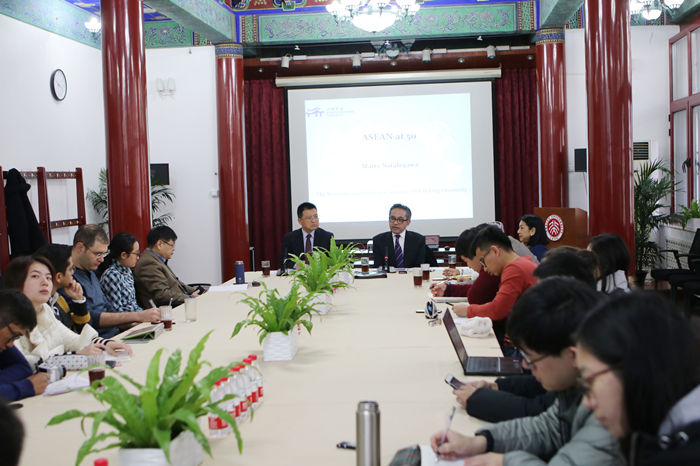
On the morning of December 11, 2017, accepting the invitation of the Institute of International & Strategic Studies (IISS), Peking University (PKU), Former Minister of Foreign Affairs of Indonesia Marty Natalegawa attended the 4th “North Pavilion Dialogue” and delivered a keynote speech entitled “ASEAN at 50” at North Pavilion, PKU. More than twenty people attended the speech, including Prof. Wang Jisi, President of IISS, Prof. Wang Dong, Associate Professor of School of International Studies (SIS), PKU, Embassy staff of the Indonesian Embassy, as well as teachers and students from PKU. The event was hosted by Associate Prof. Yu Tiejun, Vice President of IISS.
Mr. Natalegawa firstly reviewed the main changes happened over 50 years since ASEAN’s establishment. 50 years ago, that is, in 1967, the world was very much consumed by the Cold War politics raging at that time due to the U.S.A.-U.S.S.R. and the East-West rivalries. Then the world entered the so-called post-Cold War era, with the U.S. being the sole dominant power in a unipolar world. And now we start entering what has been described as the return of the age of geopolitics. Meanwhile, the nature of power itself has transformed, which is not only shifting among countries, but within them, more non-state actors have emerged on the world stage. In short, from 1967 to 2017, the nature of power has become more diffused and more complex, and less certain. From the geo-economic point of view, the world’s gravity center is gradually shifting from the the U.S. and Europe to the Asia-Pacific region.
Mr. Natalegawa then elaborated on three types of transformations ASEAN has undergone. The first transformation took place in Southeast Asia. Specifically, ASEAN has expanded from the 5 member states when it was established to the 10 member states at present. There were contending views during the expansion, but ASEAN has eventually welcomed new member states to join it. Mr. Natalegawa stressed that ASEAN must unite as one and move towards the building of a “community”, while preventing internal confrontation. Otherwise, ASEAN member states would seek security and economic prosperity outside the Organization. The second transformation refers to the transformation of the role that ASEAN plays in the international community. For a long period of time, Southeast Asian countries were objects in the East-West rivalry. With the growth of ASEAN’s own strength, ASEAN hopes to play a more important role in the international arena. In 2005, Indonesia successfully persuaded ASEAN member states to accept the idea of East Asia Summit (EAS), which is currently the only mechanism that includes all relevant countries in the region. This is one of ASEAN’s successes. However, as things stand, the EAS is more of a “exchange of greetings” forum and has not produced any substantial impact yet. This is something should be changed. The third transition is ASEAN’s transformation from being largely state-centric to becoming more people-centric. In the 50 years since its founding, ASEAN’s population, per capita GDP, and total GDP have experienced great growth, and people in the region have become increasingly prosperous. In the meantime, while deeply respecting and adhering to the principles of state sovereignty and non-interference, ASEAN has continuously accepted the standards of good governance, democracy, and human rights.
At the end of his speech, Mr. Natalegawa spoke about the relations between ASEAN and China, and was very optimistic about these relations. In the Q&A session, Mr. Natalegawa answered questions raised by teachers and students on issues of China-Indonesia relations and coordination of the cooperation in the economic and security field in Asia.

